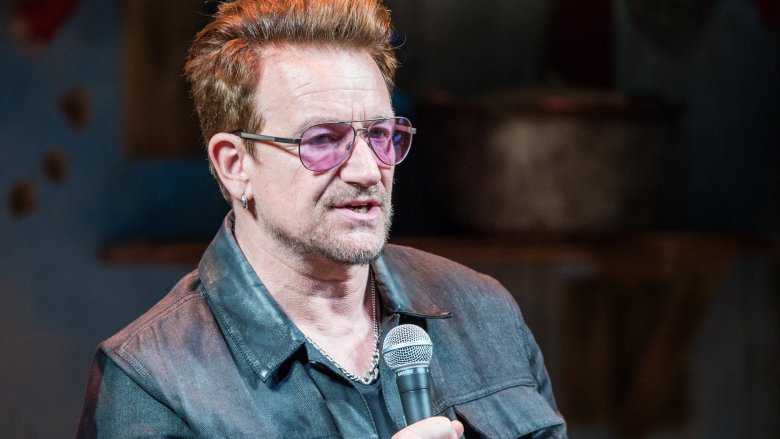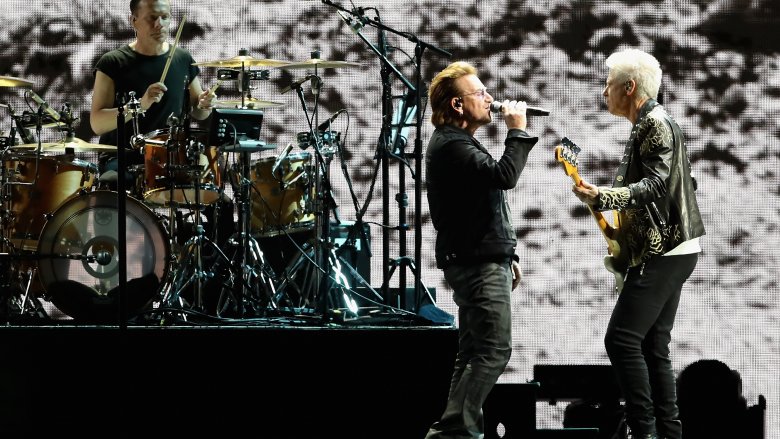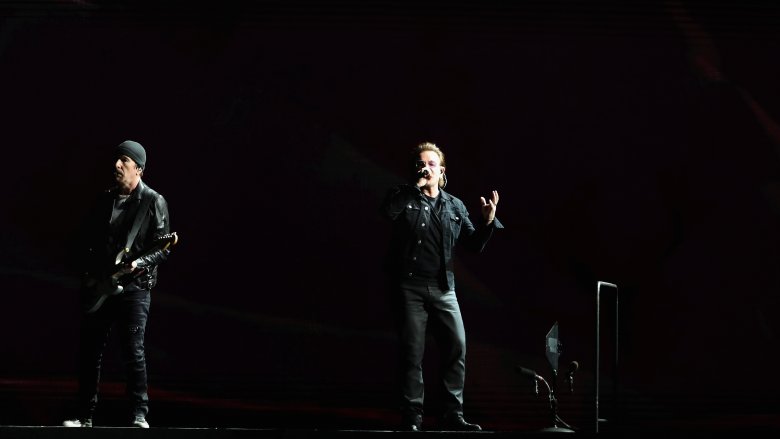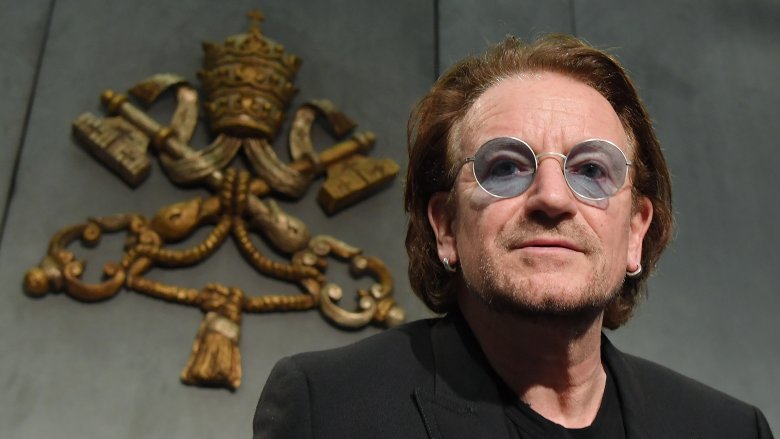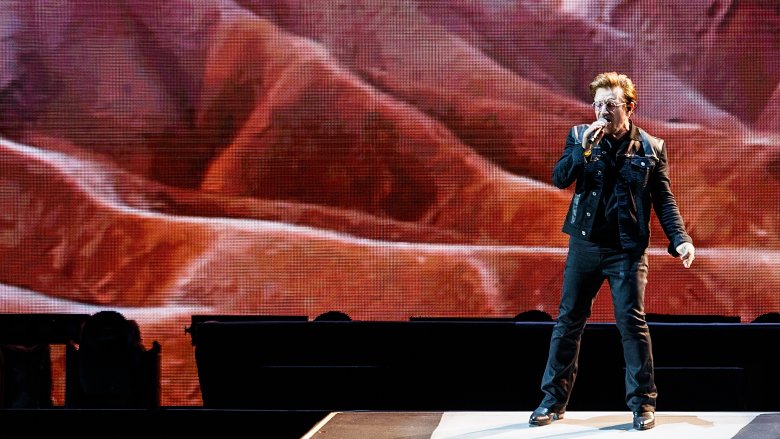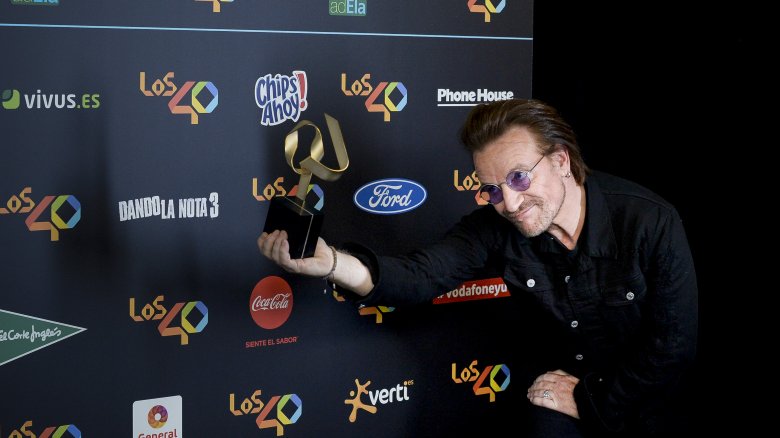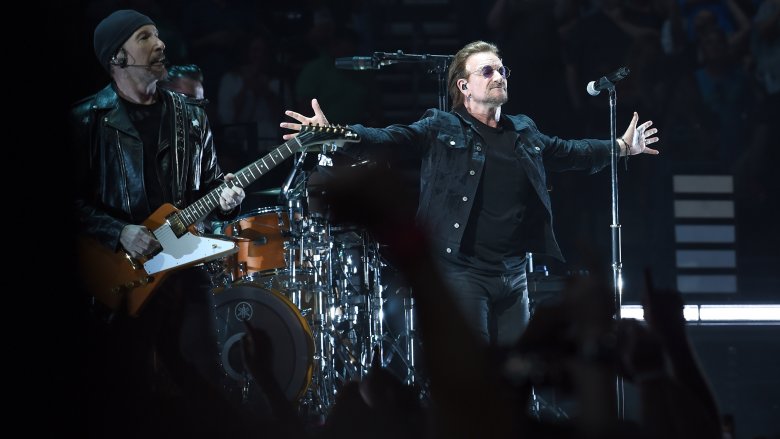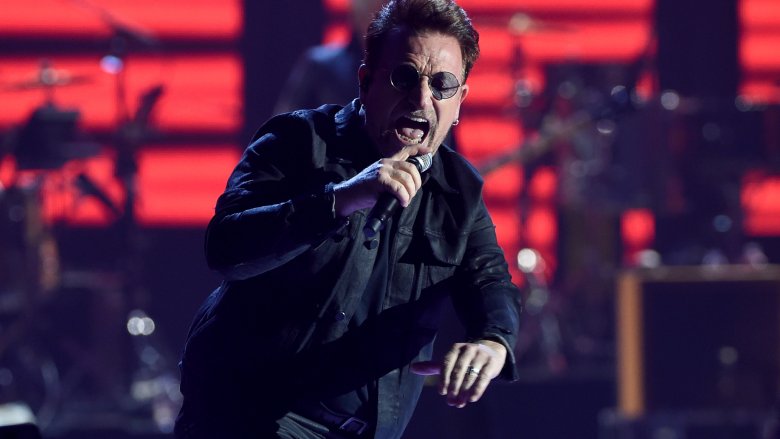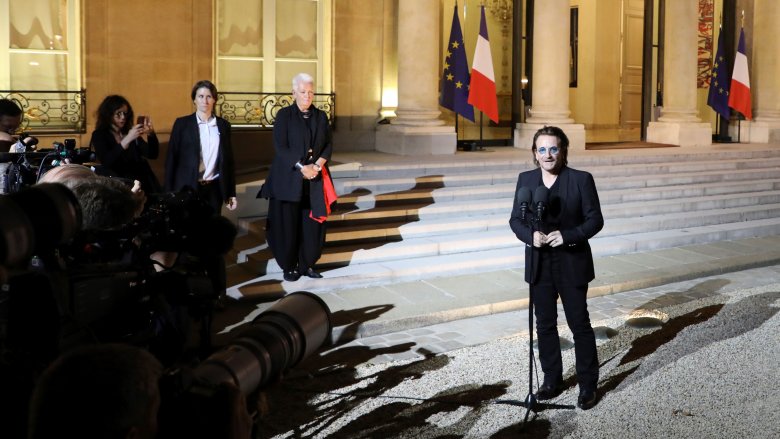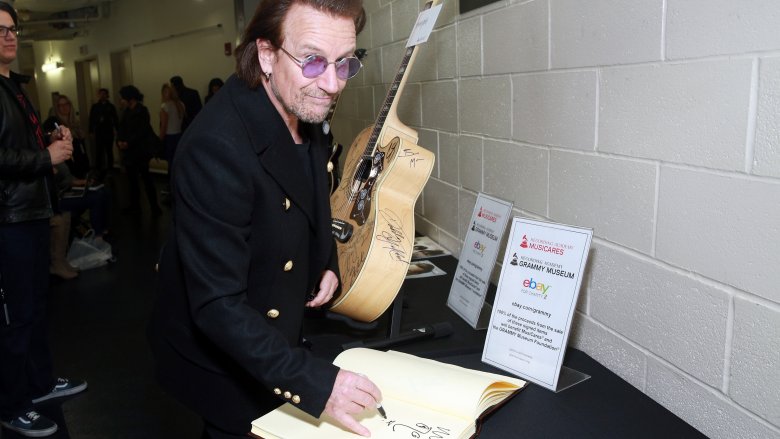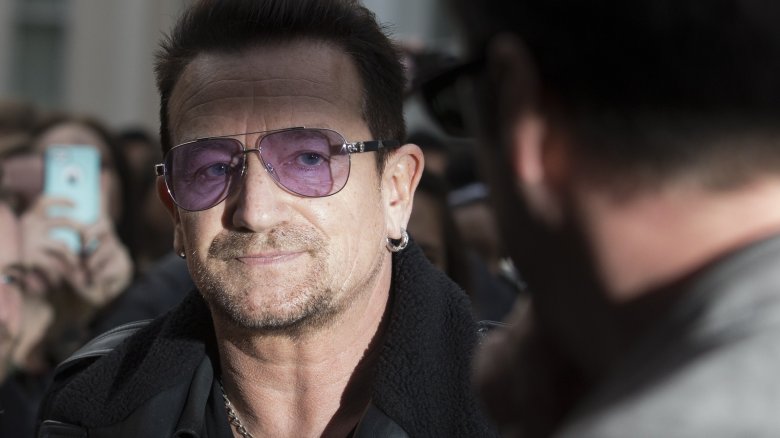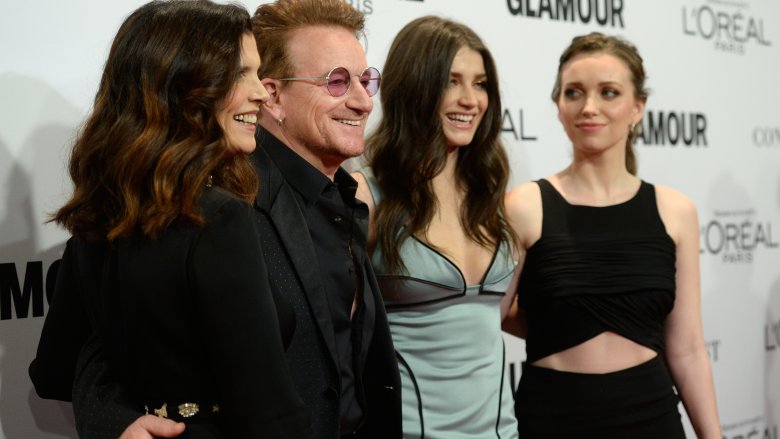The Untold Truth Of Bono
As one of the top-valued musicians in the world, Bono is a hugely polarizing figure. On one hand, he's been behind some of the greatest, most popular music of a generation, and he's been one of the most vocal celebrities when it comes to raising awareness of various issues.
On the other hand ... well, he's been behind some of the greatest, most popular music of a generation, and he's been one of the most vocal celebrities when it comes to raising awareness of various issues.
And that's made people either love him or hate him. There's no in-between with Bono, and there's also no denying he's an influential figure in music and on the world stage. Most of the interviews he does are about something much, much larger than himself, so it's tough to get a feel for the man behind the sunglasses. What's up with those sunglasses, anyway?
Be glad he went with 'Bono'
There's a certain amount of conceit that can go along with giving yourself a single name, and it just sort of assumes there's no more explanation needed. Bono's real name is Paul Hewson, and admittedly, it doesn't have the same sort of ring to it. He wasn't always going to be Bono, though — he went through a few less cool names first.
Originally, the Telegraph says his nickname was Steinhegvanhuysenolegbangbangbang, and that's no joke. (The term "nickname" apparently means something different in Dublin.)
It actually gets weirder. His nickname changed after a friend spied a hearing aid shop in Dublin called Bonavox of O'Connell Street. So, of course ... he became known as "Bonavox of O'Connell Street." Bonavox, says the Guardian, is actually Latin for "good voice," and while it's an appropriate name for a hearing aid store, it's also pretty darn good for a singer, too. He eventually shortened that just to "Bonavox," that turned into "Bono Vox," and now, everyone just calls him Bono. Thankfully.
What's with the sunglasses?
One of the things Bono gets an immense amount of hate for is his sunglasses. He's always wearing them, and sometimes, it's just dark out already, man. But any haters who knock him for always wearing them should know it's not a style choice, it's a medical necessity — especially with a job that involves all kinds of flashing and bright lights.
In 2014, chat show host Graham Norton finally called him out on his BBC One show, asking if he ever took them off. Bono responded, "This is a good place to explain to people that I've had glaucoma for the last 20 years."
Glaucoma is no joke. According to the National Eye Institute, it damages the eye's optic nerve and, if untreated, leads to blindness after complete loss of peripheral vision. There's no cure for it, and it can be made worse by a build-up of pressure in the eye. The condition makes people more sensitive to bright lights of any kind, and many people diagnosed with glaucoma opt for dark or shaded glasses to help the sensitivity. Now everyone should feel bad for hating on him.
Spiritualism and conflict
Bono was born in Dublin on May 10, 1960 (via Biography), to a Roman Catholic father and a Protestant mother. That might not sound like a big deal to most Americans, but at the time in Ireland, it was a huge deal. It would be only eight years later that the bloody Troubles would kick off in earnest, rooted in the conflict between Ireland and England, Catholics and Protestants.
It had a huge effect on young Bono, who told Rolling Stone, "I knew that we were different on our street because my mother was Protestant. And that she'd married a Catholic." In another interview, he stressed just how big a deal it was: "Their love affair was illicit at the time. ... The Protestant-Catholic rivalry — the bigotry — was at a pitch. But it didn't mean anything to them. They faced the flak and got married." Bono says he, his brother, and mother went to a Protestant church, while his father went to a Catholic one. It didn't sit well with him: "I was always fighting with him. Always fighting."
While Bono's rebellious behavior got him nicknamed "the Antichrist," he also says the conflict shaped his taste in music. He's said music "that really turns me on is either running toward God or away from God," and that sometimes, it's the music that's angry at God that's the most powerful.
His upbringing was ridiculously violent
When Rolling Stone asked him if he had any happy childhood memories, he responded with, "None at all. The little pieces that I can put back together are, if not violent, then aggressive."
He then told a story about his first day at school, and it involved another kid getting his ear bitten. Bono stepped in, grabbed the biter, and slammed his head into an iron railing. "It's terrible, but that's the sort of thing I remember. ... I remember real anger."
His mother died when he was barely a teenager, and he has said that's a huge part of where his anger comes from. Never close to either his mother or father, once his mother died, he no longer had a home, that "it was just a house." That unhappy home life led to him growing up mostly on the streets of Dublin, where he told Rolling Stone he joined a street gang that would put on performances in Dublin streets as "a way of fight back against the prevailing bootboy mentality."
More often than not, being on those streets meant daily fights, like when he was attacked by a guy wielding an iron bar and he needed to grab a nearby garbage can lid to use as a shield to keep the random guy from splitting his skull open.
Yes, he knows people hate him
It's no secret that a ton of people hate Bono, but it's easy to see how he might not know that, sitting at his place on the top of the world. But he does know it, and he does know exactly why he's seen as a bit of a hypocrite. And yes, it bothers him.
He told Rolling Stone, "the necessary narcissism of being a writer and performer conflicted me. You could be bought off by your success and forget your ideals." Weirdly, he's most hated in his native Ireland. There are few nods to him — or U2 — in Dublin, but there is graffiti declaring sentiments like "Bono is a Pox." He's done so much good, so what gives?
The Guardian took to the streets to find out just why the average Dubliner hates him so, and most answers were because "he's a bit sanctimonious." Most people declared they hated him because he'd done so well. That's a uniquely Irish attitude he talked a bit about on Conan O'Brien.
"Irish people are so messy, and it's very different than in America. In America, when you look up at the mansion on the hill, and you say, 'One day, I'm going to live in that mansion.' In Dublin, where we come from ... people look at the mansion and go, 'One day, I'm going to get that son of a b****.'"
His father tried to talk him out of music
Bono has told Rolling Stone that he and his father were never particularly close and that he never even knew what he did until he retired. There was more — or less, depending on your point of view — to the relationship than just a vague association, and even decades later, he told the Telegraph he's still upset his father once turned down the gift of a grand piano being passed down through the family.
"As a kid, I would have loved to have learned to play the piano. I think I'm more angry about the reasons I didn't."
Bono's father sang, too, and he loved the opera — but he never did any singing professionally or publically, fearing rejection. In 2017, Bono told Howard Stern that's why his father had discouraged him from pursuing music of any kind. "He didn't want me to be disappointed," he said. "To dream is to be disappointed, I think that was it."
The distance that was between them is pretty heartbreaking. He's said that one of the things he'd always hoped to hear his father say was that he loved him.
On why the words will always change
It doesn't matter how well concert-goers know the words to all their old and favorite U2 songs — anyone trying to sing along will almost always get tripped up at some point. That's because Bono has an odd sort of relationship with some of their old songs: He doesn't particularly like them much.
"Usually Edge, when we have a greatest hits collection coming out, has to struggle to get me to listen to it because it feels dead to me," he told NPR.
They were talking about The Joshua Tree at the time, an album that was almost called The Two Americas in reference to the schism between the American dream and the real "potentially broken promised land." In revisiting that iconic album, he also admitted that he changes the lyrics to songs all the time — and no, not because he doesn't remember what they're supposed to be. "I felt the first ones were just sketches a lot of the time," he said. "I'm proud of the thoughts behind the material, but sometimes not the expression of the language. So I do change, all the time."
A trip to Ethiopia sparked his activism
When Rolling Stone asked about his 1985 trip to Ethiopia, Bono linked it to his justification for being a rock star. He's said that trip truly sparked all the activism that would define him later, and even at the time, they did a lot of good. Bono and his wife visited an orphanage, stayed in one of the tents set up inside the protection of a barbed wire fence, and woke to thousands of people who had made the journey to see them.
"People would leave their children in rags, some would be alive, some wouldn't," he said of the orphanage. "For a couple of kids from the suburbs, it was a very overwhelming experience."
They had helped raise a ton of money with LiveAid, and while they were there, they also developed a program to teach children what they needed to do with the help they were given. That entailed making a series of songs and sketches to teach principles like planting seeds to grow more crops, instead of just eating the seeds.
Decades later, Bono's guide, Steve Reynolds, wrote about the trip for World Vision. He said he had dealt with celebrities before, people who wanted to be seen during the famine. But Bono was hands on. He helped, he held the children, and he worked in the camps that most celebrities just passed through. And he made a huge difference in the lives of everyone he met.
He's not a fan of today's music
In 2017, Bono gave Rolling Stone an in-depth interview in which he made a single, short comment that got him a ton of hate. When asked what he thought about his son's idea that there was a "rock & roll revolution around the corner," he sure answered.
"I think music has gotten very girly," he said. "And there are some good things about that, but hip-hop is the only place for young male anger at the moment — and that's not good. When I was 16, I had a lot of anger in me. You need to find a place for it."
He blamed streaming for the girly-fication of music, saying teenagers who listened to a pop song 100 times a day were suddenly becoming valuable to the streaming model but weren't necessarily listening to the best music out there. Social media was having none of that and the Guardian reported the roasting was almost instant with people suggesting lots of things, including telling Bono that if he wanted to see some young male anger, he could just have Apple add his music to everyone's iPhones again.
His annual Christmas busking
U2 has sold out stadiums for decades, so the chance of Bono showing up on the street for an impromptu performance seems pretty unlikely, right? Only, he started doing exactly that.
For years, Bono has randomly shown up somewhere on Dublin's Grafton Street during the Christmas season, for a surprise event he organizes to raise money for one of Ireland's largest homeless charities, Simon Community. He's had to miss a few years, Rolling Stone says, like 2014. That's when a bicycle accident left him in a cast, but he was back on the streets with some friends the following year.
He's been joined by the likes of Sinead O'Connor, Lisa Hannigan, and Glen Hansard of The Frames, (via the Irish Independent), although the lineup varies every year. It's always unannounced, and anyone who's worried about crowds is right. In 2016, the crowd was so big — and assembled so quickly — that the Journal reported the Gardai had to shut the entire thing down after just three songs. Where's their Christmas spirit?
His 'one final thing'
Bono is chock full of wisdom, and he'll share it whether people want to hear it or not. But what about the deeply personal advice he shares with those closest to him: his children?
Bono told Bill Flanagan of Sirius' Written In My Soul just what he would say if he had the chance to tell his children — and the world — just "one final thing."
He replied: "I came up with the phrase, 'Love is bigger than anything in its way.' And I mean it. And that is not an airy-fairy, flowers-in-the-hair version of love. ... I mean the thing that experience has taught me, above all else, is the primacy of fun and frolics and devilment and mischief and joy as a defiant act against our mortality."
And he's promoting that message in the coolest of ways. According to Vogue, U2 gave any independent filmmakers who wanted it the freedom to reinpretret the song that features that message. And many have, including photographer David Mushegain. He took the song to the streets and used it to help document Dublin's street kids, particularly the LGBTQ slice of them. And that's pretty cool.
